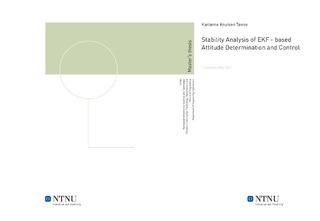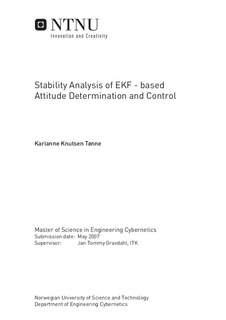| dc.contributor.advisor | Gravdahl, Jan Tommy | nb_NO |
| dc.contributor.author | Tønne, Karianne Knutsen | nb_NO |
| dc.date.accessioned | 2014-12-19T14:01:30Z | |
| dc.date.available | 2014-12-19T14:01:30Z | |
| dc.date.created | 2010-09-03 | nb_NO |
| dc.date.issued | 2007 | nb_NO |
| dc.identifier | 347457 | nb_NO |
| dc.identifier | ntnudaim:3338 | nb_NO |
| dc.identifier.uri | http://hdl.handle.net/11250/259608 | |
| dc.description.abstract | This thesis is a part of the SSETI (Student Space Exploration Technology Initiative) project, where students from several universities around Europe work together with the European Space Agency (ESA) with designing, building, testing and launching an Earth-Moon satellite orbiter (European Student Moon Orbiter (ESMO). A satellite model with reaction wheels placed in tetrahedron was deduced in a preliminary study together with an extended Kalman filter to estimate the attitude from star measurements. The stability and convergence properties of this system are studied in this thesis. Previous studies on the convergence of extended Kalman filter are presented and a proof of exponentially convergence of a system with extended Kalman filter is given and used to prove that ESMO with the extended Kalman filter converges exponentially. The most recent work and different methods to apply a nonlinear separation principle is presented. Three feedback controllers with proof of global asymptotic stability (GAS) is then introduced and implemented on ESMO. Based upon the global asymptotic stability of the feedback controllers, and the proof that the extended Kalman filter works as an exponentially observer, a nonlinear separation principle is deduced. The closed loop system can then be stated globally asymptotically stable based upon the deduced separation principle. The closed loop with the three different controllers is then simulated in Simulink for varying gains and different reference steps. The three controllers show stable characteristic as the theory implies. The robust controller shows best tracking and estimation properties, it is very accurate, simple, robust and adaptable to environmentally changes, and is therefore proposed as the most suitable controller for ESMO. | nb_NO |
| dc.language | eng | nb_NO |
| dc.publisher | Institutt for teknisk kybernetikk | nb_NO |
| dc.subject | ntnudaim | no_NO |
| dc.subject | SIE3 teknisk kybernetikk | no_NO |
| dc.subject | Reguleringsteknikk | no_NO |
| dc.title | Stability Analysis of EKF - based Attitude Determination and Control | nb_NO |
| dc.type | Master thesis | nb_NO |
| dc.source.pagenumber | 120 | nb_NO |
| dc.contributor.department | Norges teknisk-naturvitenskapelige universitet, Fakultet for informasjonsteknologi, matematikk og elektroteknikk, Institutt for teknisk kybernetikk | nb_NO |

